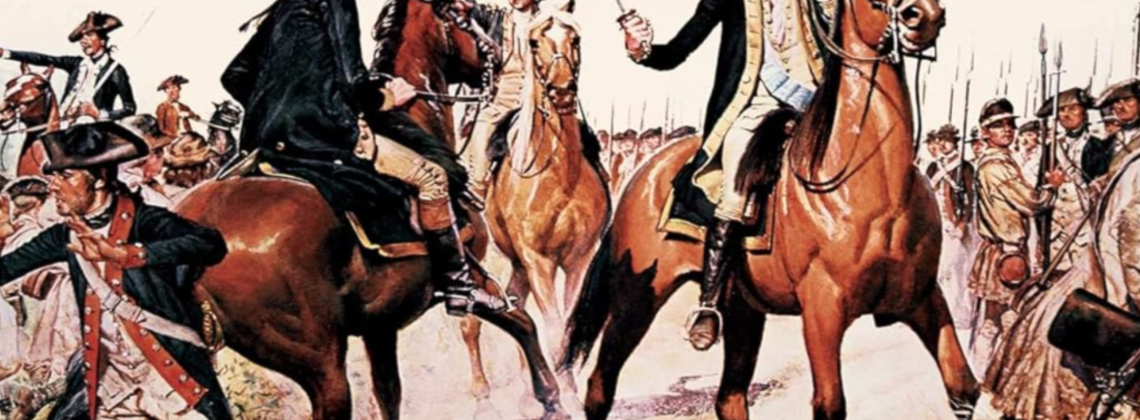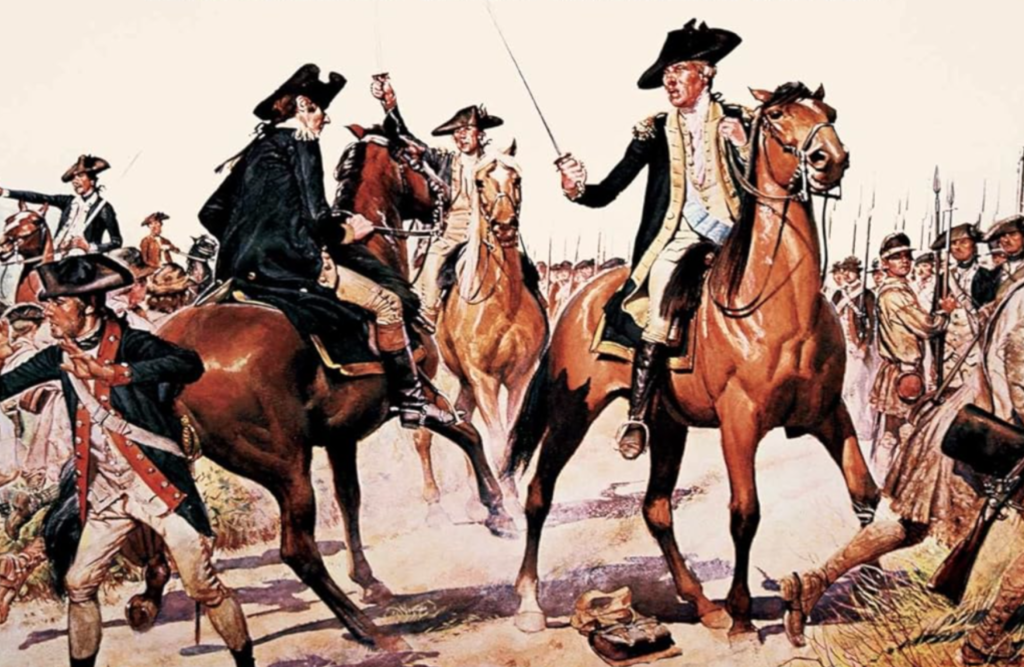

Aaron Burr recruits for an uprising in the West
This essay is a Preview, a new occasional feature at Current and a companion to our Review features. In Previews we publish short excerpts from new and upcoming books that tell a good story and fit our general mission of commentary, reflection, judgment.
This essay has been adapted from A Republic of Scoundrels: The Schemers, Intriguers, and Adventurers Who Created a New American Nation, edited by David Head and Timothy C. Hemmis. Pegasus Books, 2023. 368 pp., $32.00
*
On August 25, 1806, former Vice President Aaron Burr arrived at Morganza, the Western Pennsylvania homestead of Colonel George Morgan, Sr., a friend from his Revolutionary War days. Burr knew many Westerners were unhappy with the federal government, as it was run by people from the East, and he knew Morgan had been involved in a short-lived scheme with the Spanish to found a colony for disgruntled Americans called New Madrid (near present-day Missouri) in 1788. Burr, he hoped, could count on his old friend to join a new adventure in the American West. By the time Burr departed, however, Morgan was writing to another old friend, President Thomas Jefferson, to raise the alarm about what Burr had planned. Five months later, Jefferson issued a warrant for Burr’s arrest. The charge? Treason.
After his 1804 duel with Alexander Hamilton, Burr toured the western part of the United States, where he recognized a festering division between the East and the West. The people of the west were often skeptical of the new federal government and whether it secured the blessings of liberty or created just another distant, centralized authority to ignore their interests. The 1794 Whiskey Rebellion in Western Pennsylvania and Virginia was the most obvious sign of discontent, and though put down by the federal government, Burr recognized the attitudes of the insurrectionists did not disappear. He thought he could manipulate those divisions for his own ends. What Burr intended remains a mystery, with goals said to include filibustering in Mexico, carving out an independent republic in the west, or marching on Washington, DC, with an army of frontiersmen. It is possible he had no settled plan and changed goals as events unfolded. What is certain, however, is that as Burr toured the West, he sought out individuals unhappy with the status quo, men who might follow wherever he chose to lead.
When Burr rode up to Morganza, in Canonsburg, south of Pittsburgh, he was met by the oldest of Morgan’s three sons, John. On the way to the house, John recalled hearing several odd comments from Burr. First, he remarked that “that the union of the states could not possibly last.” Burr predicted that “a separation of the states must ensue as a natural consequence.” Then, Burr peppered John with questions about Washington County, Pennsylvania, especially its militia and officers. Finally, while running into one of the farmhands on their ride, Burr gave the young man a strange compliment. “He wished he had ten thousand such fellows,” Morgan recalled Burr saying.
Dinner began pleasantly, but the conversation soon turned heated. It began innocently. Over a glass of wine, Morgan jested that the region had grown so rapidly “that by and by we should have congress sitting in this neighborhood or at Pittsburgh.” Burr, however, didn’t think it was an idle prediction. An independent national capital might really be built nearby, “for in less than five years,” he retorted, “you will be totally divided from the Atlantic states.” Burr’s comment, made in earnest, worried Morgan.
The discussion escalated as Burr argued that the eastern states were exploiting the western states. Land speculation, he said, only benefited the east. “The people to the west should not be tributary” to the eastern states. Turning to the heavy taxes imposed on westerners by leaders from the east, Burr played up the rhetoric of the American Revolution. “Our taxes were very heavy,” Burr complained. He “demanded why we should pay them to the Atlantic parts of the country?” Colonel Morgan condemned the argument. “God forbid!” he exclaimed. “I hoped that no such things would ever happen, at least in my time.” Politically, Morgan was probably a Jeffersonian republican and did not want to see his country torn apart. He had worked hard to build his estate, family, reputation, and status in society.
The conversation then took an even more disturbing turn. Speaking of “the weakness and imbecility of the federal government,” Burr went on a tirade. “With two hundred men he could drive congress, with the president at its head, into the river Potomac,” Morgan recalled. Burr derided the weakness of Eastern people; a small force would easily conquer them. “With five hundred men,” Burr boasted, “he could take possession of New York.” However, Thomas Morgan, the middle Morgan son, took offense, saying “he would be damned if they could take our little town of Canonsburg with that force.” Always quick witted, Burr made a concession to the younger man. “Confine yourself to this side of the mountain, and I’ll not contradict you.” Burr then left the room, but he motioned for Thomas to follow.
The two left for a short walk. Thomas Morgan thought the moment was ripe to share his aspiration to be a lawyer. But Burr was in no mood to help. “Colonel Burr inquired what my pursuits were,” Thomas later testified. “I informed him that I was studying the law.” Burr poured cold water on his plans. “He was sure I could not find employment for either body or mind,” Thomas said, because, according to Burr, “under our government there was no encouragement for talents.” Virginia Congressman John Randolph had said so openly, declaring “on the floor of congress that men of talents were dangerous to the government.”
Burr told Thomas he had a better idea. He wondered if Thomas had any desire to join his military expedition. “It would entirely depend,” Thomas replied, “upon the object or cause for which I was to fight.” That was not a “no,” and so Burr continued to pressure Thomas to join him. He also turned to the youngest Morgan brother, George Jr., saying “he was a fine, stout-looking fellow,” and he “would like to see him at the head of a corps of grenadiers.” Hearing these comments and concerned about his brothers, John Morgan informed their father.
Burr retired to his bedroom, but he was not done probing for information. Around 11:00 p.m. he returned downstairs to speak to the elder George Morgan about Francis Vigo of Fort Vincent (Vincennes), who, in 1788, had been part of a rumored conspiracy to seed discontent in the western United States. Burr either wanted to learn more about Vigo or to recall a time when Morgan had been no stranger to Western plots to broach the topic of his joining a new scheme. Morgan would not take the bait. “I called it a nefarious thing to aim at the division of the states,” Morgan would testify.
The next morning Burr left early with John Morgan for a tour of Washington, Pennsylvania. Burr wanted to meet David Bradford, one of the ringleaders of the Whiskey Rebellion, who used to reside there. But Bradford had left Pennsylvania to live in Baton Rouge. Learning a meeting was impossible, Burr promptly left Washington. When John Morgan returned home, he encouraged his father to inform Jefferson of the danger posed by Burr. Three days later, George Morgan wrote to the president.
Unfortunately, no copy of Morgan’s letter exists, but years later in a note to Morgan’s daughter, Jefferson confided it was her father’s letter that first alerted him to Burr’s treasonous intentions. That was a comforting thing for Jefferson to say, but Morgan was not the only voice calling attention to Burr’s activities in the west. He was hearing from other military and government officials expressing a similar alarm. The union, Jefferson concluded, was not safe from Aaron Burr and an arrest order went out for the notorious American scoundrel.
David Head is associate lecturer of history at the University of Central Florida and distinguished faculty fellow in history at Kentucky Wesleyan College. He is the co-editor A Republic of Scoundrels: The Schemers, Intriguers, and Adventurers Who Created a New American Nation.
Timothy C. Hemmis is an associate professor of history at Texas A&M University-Central Texas. He is the co-editor of A Republic of Scoundrels: The Schemers, Intriguers, and Adventurers Who Created a New American Nation.